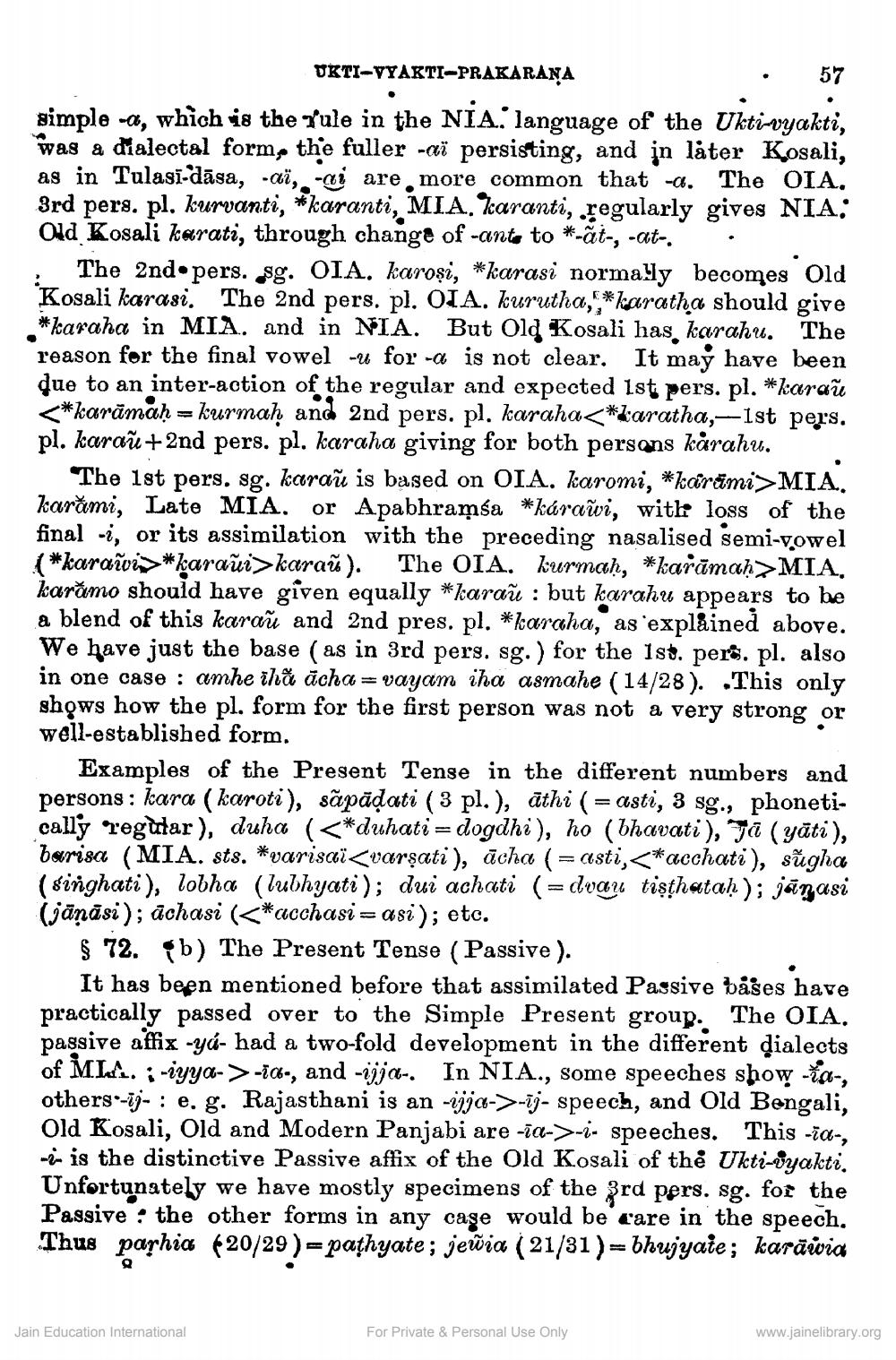________________
UKTI-VYAKTI-PRAKARANA
• 57 simple -a, which is the rule in the NIA, language of the Ukti-vyakti, was a dialectal form, the fuller -aï persisting, and in låter Kosali, as in Tulasi-dāsa, -aï,, -ai are more common that -a. The OIA. 3rd pers. pl. kurvanti, *karanti, MIA, karanti, regularly gives NIA: Old Kosali kerati, through change of -anto to *ãt-, -at-. .
The 2nd pers. sg. OIA. karoşi, *karasi normally becomes Old Kosali karasi. The 2nd pers. pl. OIA. kurutha, * karatha should give *karaha in MIA. and in NIA. But Old Kosali has, karahu. The reason for the final vowel -u for -a is not clear. It may have been due to an inter-action of the regular and expected 1st pers. pl. *karaže <*karāmaḥ= kurmah and 2nd pers. pl. karaha<*karatha,-1st pers. pl. karañ+2nd pers. pl. karaha giving for both persans karahu.
The 1st pers. sg. karaŭ is based on OIA. karomi, *karāmi>MIA. karămi, Late MIA. or Apabhramsa *kárawi, with loss of the final -, or its assimilation with the preceding nasalised semi-vowel ( *karawi *karaŭi> karaão). The OIA. kurmaḥ, *karāmaḥMIA, karămo should have given equally *karañ : but karahu appears to be a blend of this karañe and 2nd pres. pl. *karaha, as explåined above. We have just the base (as in 3rd pers. sg.) for the 1st. pers. pl. also in one case : amhe thă ācha = vayam iha asmahe ( 14/28). This only shows how the pl. form for the first person was not a very strong or well-established form.
Examples of the Present Tense in the different numbers and persons : kara (karoti), sãpāờati (3 pl.), āthi (= asti, 3 sg., phonetically regular), duha (<*duhati = dogdhi), ho (bhavati), Tā (yāti), berisa (MIA. sts. *varisaï<varşati), ācha ( = asti,<*acchati), sãgha (singhati), lobha (lubhyati); dui achati ( = dvau tişthataḥ); jānasi (jānāsi); āchasi (*acchasi = asi); etc.
§ 72. (b) The Present Tense (Passive ).
It has been mentioned before that assimilated Passive bases have practically passed over to the Simple Present group. The OIA. passive affix -yú- had a two-fold development in the different dialects of ML. ;-iyya->-id-, and -ujja-. In NIA., some speeches show -ta-, others--īj- : e. g. Rajasthani is an -ijja->-īj- speech, and Old Bengali, Old Kosali, Old and Modern Panjabi are -ia->-;- speeches. This -ia-, -;- is the distinctive Passive affix of the Old Kosali of the Ukti-vyakti. Unfortunately we have mostly specimens of the Zrd pers. sg. for the Passive : the other forms in any case would be care in the speech. Thus parhia (20/29 ) = pathyate; jewia ( 21/31 ) = bhujyaie; karāiia
Jain Education International
For Private & Personal Use Only
www.jainelibrary.org




